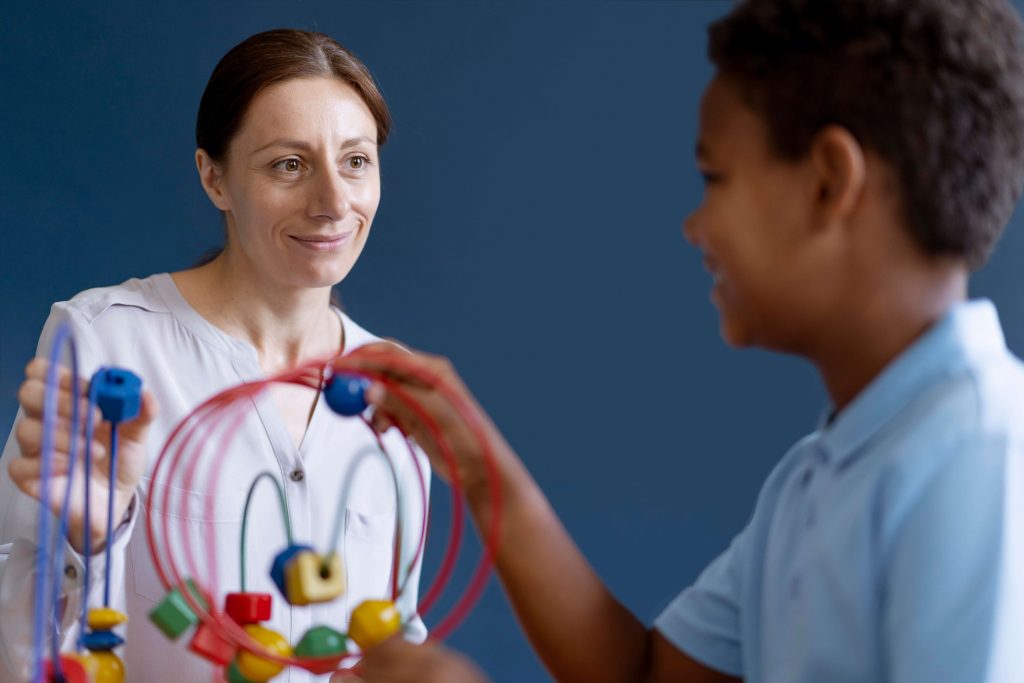Allied Health Assistants are playing an important role in growing and expanding the delivery of allied health services across Australia. However, many people don’t fully understand their place within the workforce and how they can help participants maximise their therapy plans and overall quality of life. This blog post is important for people already receiving allied health services, but also for people who may need to in the future.
There’s no denying that the demand for allied health services is extremely high. Many parents and participants are facing challenges when trying to find an occupational therapist or speech pathologist. Factoring in the rising costs of living and therapy, as well as an increase in chronic disease and ageing in the population, the need for allied health assistants has become more apparent.
Allied health assistants are part of the future of allied health services. With their specialised skills and knowledge, they are well equipped to support the work done by allied health professionals. Their potential is already being recognised by many organisations and allied health disciplines, particularly within the practice of occupational therapy.
To utilise allied health assistant services to their full potential, we need to understand their purpose and scope of practice. Today we will cover some common questions surrounding allied health assistant services and how Posity is able to provide these to help you achieve your goals and live your best life!
Table of Contents
What is an Allied Health Assistant?
Allied Health Assistant refers to any worker who provides support under the direct supervision and delegation of allied health professionals. To put it simply, as the term suggests, they are assistants within allied health professions.
Allied health professionals are trained professionals who specialise in the diagnosis and treatment of health concerns. They are including but not limited to:
- Occupational Therapists
- Speech Pathologists
- Physiotherapists
- Psychologists
- Pharmacists
- Osteopaths
- Podiatrists
- Audiologists
- Optometrists
It goes without saying that the allied health professions listed above are extremely diverse. Each profession has their own set of procedures, actions, and processes required to provide high-quality, effective health services.
Allied health assistants reflect this same diversity in their scope of practice. They are trained to work within one of these professional fields and undertake tasks that are delegated to them by a supervising allied health practitioner.
What do Allied Health Assistants do?

So, you may be wondering what tasks allied health assistants actually do to support allied health service delivery. The exciting nature of this job is that allied health assistants have a lot of different responsibilities, so no two days look the same. For example, an occupational therapy allied health assistant may provide direct care to a participant at home one day, and work on personal or domestic tasks the next.
Some of the different tasks and responsibilities which may be delegated to allied health assistants include but are not limited to:
- Liaising with external people. This could be clients, families, and other supports. Allied health assistants may provide information, resources, general advice, while also referring to the appropriate allied health professional for clinical concerns.
- Creating and working on treatment plans for clients. This process must be done in conjunction with and under the supervision of allied health professionals.
- Monitoring health progress. Allied health assistants may observe and assess clients progress and report changes to their supervising allied health professional.
- Completing administrative tasks. They may be involved somewhat with reporting, documenting, printing, scanning, budgeting, and equipment expenditure.
- Enhancing policies and procedures. Allied health assistant workers may help with identifying, developing, and implementing polices and procedures for allied health organisations.
Allied health assistants complete tasks which do not require clinical expertise. In the past, when allied health practitioners had to complete these tasks it would reduce the time they had to attend to complex direct care situations.
One of the most common misconceptions is that allied health assistants can work autonomously or independently to allied health practitioners. This is in fact not the case. Allied health assistants do not work in replacement of an allied health practitioner, rather they supplement and enhance the work of the allied health practitioner. An allied health practitioner must always remain responsible for all professional assessments and clinical decisions regarding client care. This means that anyone who wishes to receive allied health assistant services must be engaged with an allied health practitioner first.
What benefits do Allied Health Assistants provide?
In the same way that any assistant helps smooth and efficient processes for trained professionals, the same is true for allied health assistants. There are many benefits associated with this expanded workforce which integrates allied health assistants. The most significant benefits are summarised in the following:
- Allied health assistant services are provided at a lower rate compared to allied health professionals. This means that for clients, these services are a cost-effective way of receiving services that don’t require clinical expertise.
- When allied health professionals are able to complete non-clinical tasks this frees up more of the clinicians time. This leads to better outcomes because clinicians (have more time available for more complex direct care) can then allocate their time and efforts where they are needed most.
- Employing allied health assistants with different life experiences, knowledge, and interests creates a collaborative and diverse allied health workforce.
- Allied health assistants also help spread out the caseload which used to be the sole responsibility of allied health practitioners. This reduces feelings of overwhelm and helps prevent burnout experienced by so many allied health practitioners.
What makes a good Allied Health Assistant?

Good, allied health assistants will possess many of the same qualities of a good, allied health professional. They will be caring, communicative, and collaborative. But above all they will be passionate about helping clients achieve their best.
In terms of qualifications, the best allied health assistants will have at minimum a certificate level in a health-related field. But the most desired qualifications are a bachelor’s degree in a health-related field. Many allied health assistants may be in the process of gaining their qualifications whilst working in this role. For example, an occupational therapy student may work as an occupational therapy allied health assistant whilst finishing their study.
Good, allied health assistants are not only based on personal qualities, but also depend upon the organisation they are employed under. Allied health assistant services function best within organisations that provide comprehensive supervision by experienced allied health practitioners.
NDIS Pricing Guidelines
NDIS has pricing guidelines for allied health assistant services which are offered at two different levels depending on the workers skills, knowledge, and qualifications. Pricing at both levels is designed to help participants utilise services more frequently at a lower cost.
Allied Health Assistant Services at Posity
Here at Posity we are a leading provider of disability services across the Northern and Eastern suburbs of Melbourne. Our name simply and genuinely reflects the foundation of everything we do; Positivity. Helping you and your families achieve positive outcomes means we are always keeping up to date with new and innovative approaches to best suit your needs. Occupational Therapy Australia has released an official statement which support, encourages, and recognises the value of allied health assistants in this field. Providing allied health assistant services here at Posity is one way that we are leading progressive and responsive delivery of occupational therapy services.
Posity offers Allied Health Assistant services to support the scope and practice of our occupational therapy programs. We ensure that allied health assistants at Posity are highly educated, experienced, and reflect our positive approach to improving the lives of participants and their families. All our allied health assistants possess exceptional qualifications in allied health fields which is well above the standard across other service providers. Posity also provides comprehensive clinical supervision to allied health assistants from our highly experienced occupational therapists. You can rest assured that Posity’s allied health assistants are committed to continually provide the best opportunities and outcomes for you and your family.
If you are interested in accessing Allied Health Assistant services as part of your Occupational Therapy support plan, please contact our team today. Let us help you get the most of your NDIS plan to achieve your goals and improve your life!


